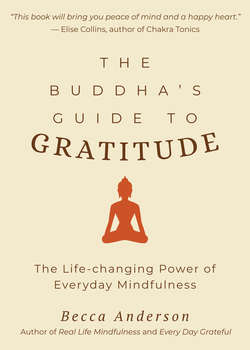Читать книгу The Buddha's Guide to Gratitude - Becca Anderson - Страница 18
На сайте Литреса книга снята с продажи.
ОглавлениеMindfulness is a word that for many has no real, solid definition. It’s all well and good to talk about paying attention to the world around you, but in real life, how practical is that, really? After all, we live in a world where we’re constantly connected—to work, to friends, even to that guy you met once in high school and who occasionally likes your tweets. What good is it to only sit and observe the places you go every day, when there’s so much else going on that you could be missing?
As many of the people quoted in this book would tell you, practicing mindfulness really does do a lot of good. In an age when practically everyone is struggling with some level of anxiety and depression, mindfulness can help you refocus. It can remind you that you likely have everything you really need. And if you don’t, practicing mindfulness can help you to accept the reality of where you are now, and help you move toward what you need, instead of allowing difficulties and hardships to bog you down.
Mindfulness is not a get-well-quick scheme. It’s a new way of life.
“The essence of bravery is being without self-deception.”
—Pema Chödrön
“Acknowledging the pain and the suffering that take place inside you, and allowing the feelings, will take time, but this new way of handling these feelings will change the way you relate to you and to the outside world.”
—Kelly Martin
“In fact, when you’re mindful, you actually feel irritation more keenly. However, once you unburden yourself from the delusion that people are deliberately trying to screw you, it’s easier to stop getting carried away.”
—Dan Harris
“By learning to allow different types of discomfort to simply stay in the room with you, without your scrambling for a button to push (real or metaphorical), you make discomfort matter less.
The pool of things you’re afraid of shrinks. It becomes a lot less important to control circumstances, because you know you can handle moments of uncertainty or awkwardness or disappointment without an
escape plan.”
—David Cain
“By identifying impermanence as a fundamental characteristic of existence itself, rather than a problem to be solved, the Buddhists are encouraging us to let go our hold on illusory solidity and learn to swim freely in the sea of change.”
—Andrew Olendzki
